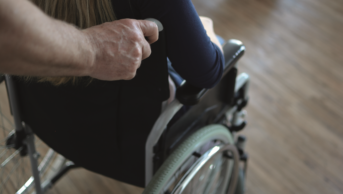
Shutterstock.com
At-home gait measurement, with varied walking conditions and frequent changes of direction, could help grade the severity of multiple sclerosis (MS), a study has shown[1]
.
The researchers analysed gait characteristics in 14 people with moderate-to-severe ambulatory impairment caused by MS, first in the laboratory setting and then with a body-worn sensor over one week of ‘everyday living’.
The team found that the accuracy of the wearable sensor was comparable to a recent study in healthy individuals and was not affected by disability severity. The measurements taken in short walking periods (<50 consecutive steps) during daily life were the most informative to determine the level of disability and effect of interventions.
Writing in PLoS One (1 May 2018), the authors concluded: “The study provides a robust approach for the quantification of recognised clinically relevant outcomes and an innovative perspective in the study of real-life walking.”
References
[1] Storm F, Nair K, Clarke A et al. Free-living and laboratory gait characteristics in patients with multiple sclerosis. PloS One 2018;13:e0196463. doi: 10.1371/journal.pone.0196463


